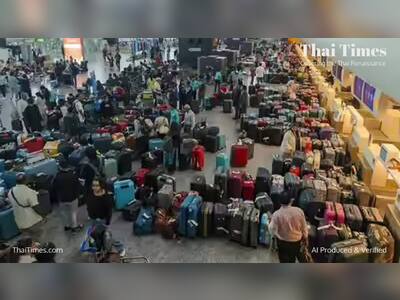Thailand’s Tourism Renaissance: A Bold Vision for 2025
With ambitious reforms and a focus on sustainability, Thailand positions itself as a global tourism leader.
As the world continues to recover from the disruptions of recent years, Thailand is embracing a transformative vision for its tourism sector. The government has declared 2025 the “Grand Tourism and Sports Year,” signaling its intent to solidify the nation’s status as a premier global destination. From infrastructure improvements to regulatory reforms, the Ministry of Tourism and Sports is crafting a strategy that not only boosts visitor numbers but also ensures long-term sustainability and inclusivity.
Expanding Horizons Beyond Beaches
Thailand has long been synonymous with its iconic beaches, but a recent surge in visits to less-traveled destinations like the Mon Bridge in Kanchanaburi highlights a shift in focus. These secondary locations offer unique cultural and natural experiences while spreading the economic benefits of tourism beyond traditional hubs like Bangkok and Phuket.
“The decentralization of tourism isn’t just about economics—it’s about giving travelers something fresh and authentic,” said Jakkaphon Tangsutthitham, vice-minister of tourism. “It’s an opportunity to showcase Thailand’s rich and diverse heritage.”
Regulatory Reforms for a Stronger Industry
A key element of Thailand’s plan involves revising the Hotel Act to bring unregistered accommodations into compliance. This move promises to elevate safety standards, promote fair competition, and cater to rising demand for sustainable tourism. Registered operators will be required to meet stricter safety and sustainability criteria, ensuring visitors enjoy high-quality experiences while supporting responsible tourism practices.
“Tourism is evolving,” said Thienprasit Chaiyapatranun, president of the Thai Hotels Association. “Travelers want safety, sustainability, and authenticity. These reforms ensure Thailand can deliver on all three.”
Making Travel Seamless
The government’s decision to implement visa-free travel for certain nations has already proven to be a game-changer. Extending this policy beyond 2024 would further enhance accessibility, especially when paired with efforts to expand flight routes and optimize airport slots. Together, these initiatives aim to attract a broader range of visitors, from budget-conscious backpackers to luxury travelers.
Additionally, revised tax refund policies for international shoppers are expected to attract high-spending tourists, boosting retail and hospitality sectors. These measures reinforce Thailand’s reputation as a welcoming and well-organized destination.
Building for the Future
Thailand is not only banking on its natural beauty and cultural allure; it is also investing in infrastructure to attract new demographics. Plans to transform the Supachalasai National Stadium into a world-class concert and event hub exemplify the government’s commitment to diversifying tourism. Such man-made attractions will complement Thailand’s traditional strengths and create a year-round appeal.
At the same time, Thailand’s focus on sustainability is forward-thinking. Encouraging eco-conscious practices among accommodation providers and promoting green initiatives positions the nation as a leader in responsible tourism. These efforts align with the growing demand from global travelers for destinations that prioritize environmental stewardship.
A Blueprint for Success
Thailand’s comprehensive approach reflects a deep understanding of the evolving needs of tourists. By embracing reforms, fostering collaboration among stakeholders, and prioritizing sustainability, the nation is setting a standard that other countries could follow.
The road ahead will require careful execution, but the foundations are strong. As Jakkaphon Tangsutthitham aptly noted, “Thailand’s tourism is not just about numbers—it’s about creating a meaningful, world-class experience that reflects our heritage and values.”
A Bright Future
Thailand’s bold vision for 2025 demonstrates its readiness to reclaim its place as a global tourism powerhouse. From the bustling streets of Bangkok to the serene landscapes of Sangkhla Buri, the country is not just recovering—it is redefining what modern tourism can look like.
As the world watches, Thailand is proving that innovation, inclusivity, and sustainability can coexist. The future of Thai tourism is not just bright—it’s transformational.
Expanding Horizons Beyond Beaches
Thailand has long been synonymous with its iconic beaches, but a recent surge in visits to less-traveled destinations like the Mon Bridge in Kanchanaburi highlights a shift in focus. These secondary locations offer unique cultural and natural experiences while spreading the economic benefits of tourism beyond traditional hubs like Bangkok and Phuket.
“The decentralization of tourism isn’t just about economics—it’s about giving travelers something fresh and authentic,” said Jakkaphon Tangsutthitham, vice-minister of tourism. “It’s an opportunity to showcase Thailand’s rich and diverse heritage.”
Regulatory Reforms for a Stronger Industry
A key element of Thailand’s plan involves revising the Hotel Act to bring unregistered accommodations into compliance. This move promises to elevate safety standards, promote fair competition, and cater to rising demand for sustainable tourism. Registered operators will be required to meet stricter safety and sustainability criteria, ensuring visitors enjoy high-quality experiences while supporting responsible tourism practices.
“Tourism is evolving,” said Thienprasit Chaiyapatranun, president of the Thai Hotels Association. “Travelers want safety, sustainability, and authenticity. These reforms ensure Thailand can deliver on all three.”
Making Travel Seamless
The government’s decision to implement visa-free travel for certain nations has already proven to be a game-changer. Extending this policy beyond 2024 would further enhance accessibility, especially when paired with efforts to expand flight routes and optimize airport slots. Together, these initiatives aim to attract a broader range of visitors, from budget-conscious backpackers to luxury travelers.
Additionally, revised tax refund policies for international shoppers are expected to attract high-spending tourists, boosting retail and hospitality sectors. These measures reinforce Thailand’s reputation as a welcoming and well-organized destination.
Building for the Future
Thailand is not only banking on its natural beauty and cultural allure; it is also investing in infrastructure to attract new demographics. Plans to transform the Supachalasai National Stadium into a world-class concert and event hub exemplify the government’s commitment to diversifying tourism. Such man-made attractions will complement Thailand’s traditional strengths and create a year-round appeal.
At the same time, Thailand’s focus on sustainability is forward-thinking. Encouraging eco-conscious practices among accommodation providers and promoting green initiatives positions the nation as a leader in responsible tourism. These efforts align with the growing demand from global travelers for destinations that prioritize environmental stewardship.
A Blueprint for Success
Thailand’s comprehensive approach reflects a deep understanding of the evolving needs of tourists. By embracing reforms, fostering collaboration among stakeholders, and prioritizing sustainability, the nation is setting a standard that other countries could follow.
The road ahead will require careful execution, but the foundations are strong. As Jakkaphon Tangsutthitham aptly noted, “Thailand’s tourism is not just about numbers—it’s about creating a meaningful, world-class experience that reflects our heritage and values.”
A Bright Future
Thailand’s bold vision for 2025 demonstrates its readiness to reclaim its place as a global tourism powerhouse. From the bustling streets of Bangkok to the serene landscapes of Sangkhla Buri, the country is not just recovering—it is redefining what modern tourism can look like.
As the world watches, Thailand is proving that innovation, inclusivity, and sustainability can coexist. The future of Thai tourism is not just bright—it’s transformational.











